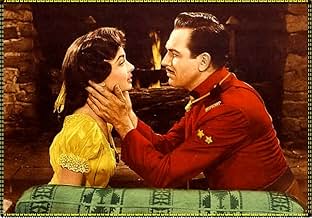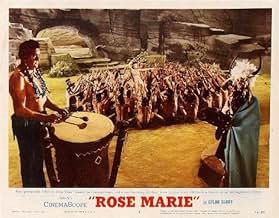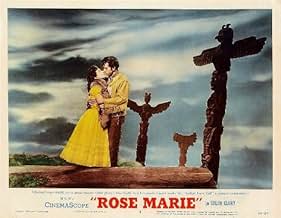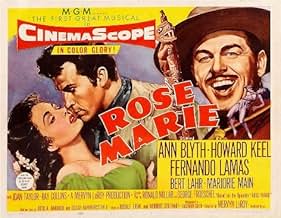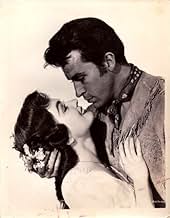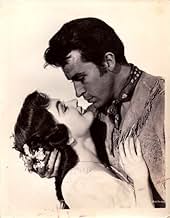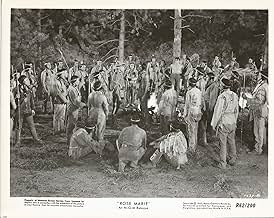Füge eine Handlung in deiner Sprache hinzuWilderness girl Rose Marie has adventures in life and love when Mountie Mike Malone takes her out of the wild.Wilderness girl Rose Marie has adventures in life and love when Mountie Mike Malone takes her out of the wild.Wilderness girl Rose Marie has adventures in life and love when Mountie Mike Malone takes her out of the wild.
Dorothy Adams
- Townswoman
- (Nicht genannt)
Fred Aldrich
- Woodsman in Saloon
- (Nicht genannt)
Robert Anderson
- Corporal
- (Nicht genannt)
John Angelo
- Man at Charity Dance
- (Nicht genannt)
Emile Avery
- Mountie
- (Nicht genannt)
Walter Bacon
- Man at Charity Dance
- (Nicht genannt)
Al Bain
- Woodsman in Saloon
- (Nicht genannt)
Margaret Bert
- Townswoman
- (Nicht genannt)
Chris Willow Bird
- Indian
- (Nicht genannt)
Oscar Blank
- Woodsman in Saloon
- (Nicht genannt)
Empfohlene Bewertungen
10sdiner82
Why hasn't this MGM musical ever gotten the acclaim it deserves? The CinemaScope/Eastman Color cinematography of the Canadian Rockies serves as a dazzling backdrop for a rousing Mounties adventure saga. Which also happens to feature a gloriously composed and sung score--Ann Blyth and Fernando Lamas's rendition of "Indian Love Call" is enthralling. Check this out the next time it shows up on Turner Classic Movies. Like "River of No Return" (with Mitchum & Monroe--shot the same year in the same breathtaking locale), it was one of the first films to exploit the new anamorphic process in its full glory--and has never been surpassed.
With a deliciously hilarious romantic subplot involving those two comedic geniuses, Marjorie Main and Bert Lahr. What more could one want? As Howard Keel sings to Blythe in the course of the title song, "Rose Marie I love you" . . .
With a deliciously hilarious romantic subplot involving those two comedic geniuses, Marjorie Main and Bert Lahr. What more could one want? As Howard Keel sings to Blythe in the course of the title song, "Rose Marie I love you" . . .
MGM's first CinemaScope musical is pictorially splendid, with what looks like on-location shooting of the Canadian wilderness, or a very good faking thereof. The lake and mountain vistas must have been spectacular on the big screen; even on a TV screen they're impressive. Also, the screenwriters dump the pretensions that marred the 1936 Nelson-Jeannette version and return closer to the 1924 stage story, streamlining it nicely and removing some of the clunkiness in the dialog. Only a handful of the original Friml-Harbach-Hammerstein-Stothart songs survive, but several of the new ones are by Friml, too (with lyrics by Paul Francis Webster), and one, "I Have the Love," is quite nice. Ann Blyth, while not credibly a backwoods French-Canadian, is lovely and with a fine set of soprano pipes, and Howard Keel reminds us again of how Hollywood underrated him--one of our most masculine musical leading men, with an easy understated acting style to back up his booming vocals. Fernando Lamas hasn't that much to do, and it feels unfair that one of Ms. Blyth's leading men has to be a good sport and just step back and let her love the other. And Bert Lahr may be a comic genius, but his and Marjorie Main's material is so rotten that you tend to forget it. Still, a couple of soundstage scenes aside, it's a gorgeous big-screen production, and not as dramatically inert as many other operetta-derived musicals. A very pleasant 107 minutes.
Canadian Mountie Mike Malone (Howard Keel) encounters orphan Rose Marie Lemaitre (Ann Blyth) on her canoe in the wilderness alone. Her father was a French trapper. She would rather live alone in the wild. Malone forces her back to Fort Macroy where she continues to rebel. In time, she joins the Mounties under Malone. She falls for French trapper James Severn Duval (Fernando Lamas).
This musical is reportedly one of Busby Berkeley's last movie work. The exterior shots have the amazing Canadian wilderness vista. The music is more opera in nature which is not my taste. Otherwise, this romance mostly works although it is very old fashion. There is some awkward stuff which is the old fashion stuff.
This musical is reportedly one of Busby Berkeley's last movie work. The exterior shots have the amazing Canadian wilderness vista. The music is more opera in nature which is not my taste. Otherwise, this romance mostly works although it is very old fashion. There is some awkward stuff which is the old fashion stuff.
when i saw Rose Marie i fell in love with it. it is a fantastic love story done in the mountains and with great songs, Indian Love Call is one of the best love songs i have heard. The scenery in the movie is to make you want more and want to be their. It is a fantastically done movie and the combination of Howard Keel and Ann Blyth was the best for this movie, since i saw this movie in 1955 i have never forgotten it and I have been looking for either a video or a DVD of this movie for many years. Please, please lets put this fantastic movie on DVD so that i may have a copy to join my other musicals of that era. They do not make movies like these any more. So again i beg of you please, please put with wonderfully fantastic movie on to DVD, so those of us who want it so much can have it.
Bears little resemblance to the (better) MacDonald/Eddy version, at least what little I can remember of it. Very much in the style of musical that MGM would do for the better part of the 50's, for better and worse. As such, it was fine. Would have improved had they cut the entire Duval/Wanda subplot and just focused on Howard Keel and Ann Blyth. Busby Berkeley worked on the staging of the musical sequences --his last major theatrical film until 1962's Jumbo-- but there was really only one short sequence which clearly bore his fingerprints: the one involving the Native American medicine man (Thurl Ravenscroft, best known for How the Grinch Stole Christmas) and a group dance centered around Wanda. In retrospect, considering Berkeley's Hollywood career as just about over, this was a fitting bookend to someone whose very first Hollywood job was on the Eddie Cantor musical, Whoopee!, faint echoes of which appeared in that aforementioned sequence. Aside from that sequence, the best part of the film was a comic number by Bert Lahr, doing a more up-tempo variation on his big number from The Wizard of Oz ('If I Were King of the Forest'). For me, this lost steam about two-thirds of the way through and never really recovered. And I didn't like the ending either. Well-produced, but still rather middling.
Wusstest du schon
- WissenswertesJoan Crawford, who played Ann Blyth's mother in Solange ein Herz schlägt (1945), played the title role in the original 1928 version of this film, which is now considered lost.
- PatzerContrary to what is written on the DVD jewel-box, the "Totem Tom-Tom" number doesn't appear in this version of the operetta. It was replaced by the Totem Dance that is seen in the film.
- VerbindungenFeatured in MGM/UA Home Video Laserdisc Sampler (1990)
- SoundtracksRose Marie
Music by Rudolf Friml
Original Lyrics by Otto A. Harbach and Oscar Hammerstein II
Revised Lyrics by Paul Francis Webster
Performed by Howard Keel; reprised by Bill Lee and the Mounties
Top-Auswahl
Melde dich zum Bewerten an und greife auf die Watchlist für personalisierte Empfehlungen zu.
- How long is Rose Marie?Powered by Alexa
Details
- Laufzeit
- 1 Std. 44 Min.(104 min)
Zu dieser Seite beitragen
Bearbeitung vorschlagen oder fehlenden Inhalt hinzufügen


